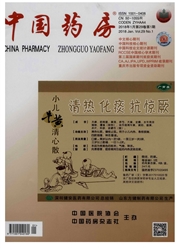

 中文摘要:
中文摘要:
目的:探索促进我国儿童合理用药的有效管理措施。方法:收集1999-2010年间我国医院儿童用药文献1298篇,从宏观和微观上系统分析影响儿童用药的主要风险因素和类型。结果:目前导致我国儿童用药风险的因素涉及4个客观因素和2个主观因素。其中,客观因素包括儿童药品政策、医疗技术水平、患者监护人受教育程度和儿童生理特点;主观因素来自道德、行为风险因素。在临床实践中,构成我国儿童用药风险的类型主要有联合用药不当,用法、用量、剂型选择不当,抗菌药物使用率过高,儿童用药品说明书的用法、用量和安全性信息标注偏少,儿童高风险药品如头孢类抗菌药、中药注射剂的临床普遍应用等。结论:国家应建立儿童药品研发的激励机制和临床合理用药的监管机制;医院应加强儿童药品专项管理体制的建设,提高用药监测和对患者监护人的用药教育水平。
 英文摘要:
英文摘要:
OBJECTIVE: To explore some effective management measures for rational use of pediatric medication in China. METHODS: 1 298 literatures about pediatric medication in the hospitals were collected from 1999 to 2010. The main risk types and risk factors of pediatric medication were analyzed from macroscopic and microcosmic perspective. RESULTS: 4 objective fac- tors and 2 subjective factors contributed to forming the risks of pediatric medication. The objective factors were made up of pediat- ric medication policies, medical technology, educational level for patient guardian, pediatric physical character; and the subjective factors included moral hazard and behavioral risk. There were 5 key risks of pediatric medication existed in the practice, including incorrect medicine combination; inappropriate usage, dosage and unsuitable selection of dosage form; the high rate of antibiotics use; inadequate explanation of usage, and dosage safety information in pediatric drug package inserts; and wide clinical use of high risk drugs for children, such as Cephalosporin antibiotics, and TCM injection. CONCLUSIONS: It is necessary to set up the national incentive policy of pediatric medicine R&D and monitoring mechanism of rational drug use. In the hospital, great impor- tance should be attached to construct the special management system of pediatric medicine, and improve drug use monitoring and the professional knowledge of patients guardian.
 同期刊论文项目
同期刊论文项目
 同项目期刊论文
同项目期刊论文
 期刊信息
期刊信息
